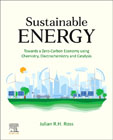
Sustainable Energy: Towards a Zero-Carbon Economy using Chemistry, Electrochemistry and Catalysis
Ross, Julian R.H.
Sustainable Energy, Towards a Zero-Carbon Economy Using Chemistry, Electrochemistry and Catalysis provides the reader with a clear outline of some of the strategies, particularly those based on various chemical approaches, that have been put forward with the aim of reducing greenhouse gas emissions in order to achieve zero carbon by 2050. The author describes the chemistry of some of the processes involved, paying particular attention to those that involve heterogeneous catalytic steps and electrolysis methods. In cases in which the technology is already established, details are given of the reactor systems used. He discusses novel developments in the areas of transport, the production of essential products using renewable energy and the uses of sustainable biomass. Outlines international approaches to cutting or reducing greenhouse gas emissions Describes current production and uses of energy Outlines new approaches to energy supply and usage Discusses the hydrogen economy and the uses of renewable energy Outlines the importance of fuel-cell and electrolysis systems Discusses biomass as a resource of energy and fuels INDICE: 1. Introduction 2. Traditional Methods of Producing, Transmitting and Using Energy 3. Less Conventional Energy Sources 4. The Production and Uses of Hydrogen 5. Biomass as a Source of Energy and Chemicals 6. Transport 7. Batteries, Fuel Cells and Electrolysis 8. The Way Forward: Net Zero
- ISBN: 978-0-12-823375-7
- Editorial: Elsevier
- Encuadernacion: Cartoné
- Páginas: 238
- Fecha Publicación: 28/02/2022
- Nº Volúmenes: 1
- Idioma: Inglés
